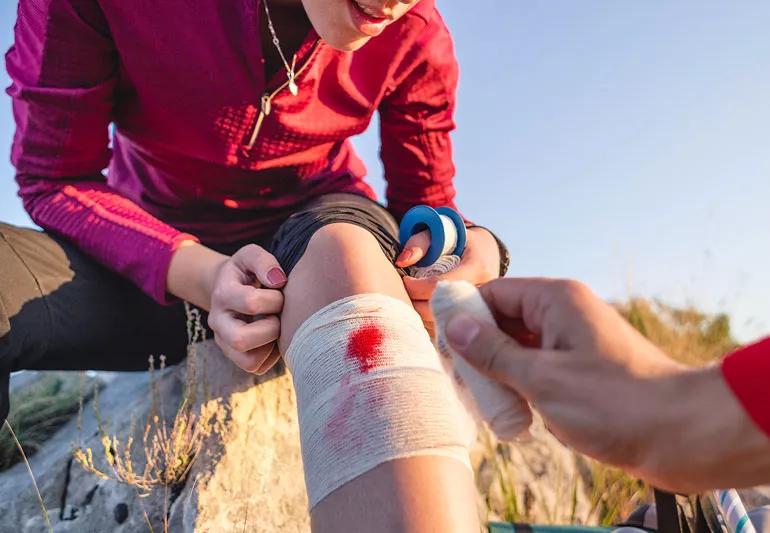Most minor cuts, scrapes and burns can be treated at home

Image content: This image is available to view online.
View image online (https://assets.clevelandclinic.org/transform/c6611732-b26d-4ff6-b644-a1d9094d4da9/care4Wounds-1211199977-770x533-1_jpg)
biker needs first aid on leg cut wounded
Minor cuts, scrapes and burns are common injuries. But do you know the best way to treat those wounds at home?
Advertisement
Cleveland Clinic is a non-profit academic medical center. Advertising on our site helps support our mission. We do not endorse non-Cleveland Clinic products or services. Policy
Nurse practitioner Evan Minior, CNP, explains the best way to care for wounds at home, and when you should seek medical help.
Before you start, wash and dry your hands.
Then, wash out the wound with a large quantity of warm, soapy water as soon as possible. It’s also OK to get in the shower and let copious amounts of warm, soapy water flow through the wound. Make sure you flush the wound bed thoroughly.
If you’re dealing with a burn, apply a cold cloth or run the area under cold water. Then, wash the burn with soap and water.
Although you may be tempted to use an antiseptic like rubbing alcohol or hydrogen peroxide, they may damage surrounding healthy tissue. New tissue is especially susceptible to harsh antiseptics because it’s more sensitive than mature skin.
“When it comes to cleaning superficial wounds, good old-fashioned soap and water is the way to go,” advises Minior.
You can use tweezers (make sure to sterilize with alcohol first) to remove any small pebbles or splinters. But if it’s larger than that, don’t try to remove them on your own. You should seek medical care in this situation.
You want to use a bandage or dressing on the wound after cleaning. Make sure you gently pat the area dry with a clean towel or washcloth. Then, apply a sterile bandage.
Advertisement
“Bandages are helpful tools for keeping your wound clean,” says Minior. “They also help maintain a moist environment that promotes healing. But that doesn’t mean you should put on a bandage and not take it off.”
You may also want to apply a thin layer of an over-the-counter topical antibiotic or petroleum gel before covering with a bandage. This can help prevent infection and keep your skin moist.
When it comes to a burn, it’s best to leave any blisters that form alone. Those blisters are there to help protect the skin. You can apply a light dressing (bandage) to keep the area clean.
Remove the bandage or dressing at least once a day to cleanse the wound. Once the wound has been irrigated and cleaned, apply a new bandage.
In more complicated wounds, like pressure sores, you may have to wash out the wound two to three times a day to help prevent infection.
“People think that irrigating wounds can lead to infection, but that’s just not true,” explains Minior. “The best way to prevent infection is by washing it out more frequently — the solution to pollution is dilution.”
You can typically take care of wounds at home without medical intervention. But not always.
If the wound is very deep or it exposes bone, organs or blood vessels, or if it’s bleeding significantly even after you’ve applied pressure, then you should visit an emergency room. If the wound is longer than 1/2 inch, you may need stitches.
You should also head to an urgent care or emergency room if the wound is from an animal or human bite or a dirty or rusty object.
Give your doctor a call doctor as soon as possible if your symptoms worsen, too. This may include worsening pain, new or worsening redness or discharge or fever.
And if it’s been more than 30 days and your wound isn’t healing, it’s time to check in with your doctor.
“If a clinician has treated your wound but your condition hasn’t improved in 90 days, you should consider getting a second opinion, possibly with a surgeon,” says Minior.
Advertisement

Delivered every Tuesday!
Sign up for our Health Essentials emails for expert guidance on nutrition, fitness, sleep, skin care and more
Learn more about our editorial process.
Advertisement
Skin care product can help with acne and fight COVID-19
The short answer from a plastic surgeon
Bleeding is a risk and warrants taking care, but the reward of this lifesaving medication is great
Severe and debilitating headaches can affect the quality of your child’s life
With repeat injections over time, you may be able to slow the development of new wrinkles
Type 2 diabetes isn’t inevitable with these dietary changes
Applying a hot or cold compress can help with pain
Pump up your iron intake with foods like tuna, tofu and turkey